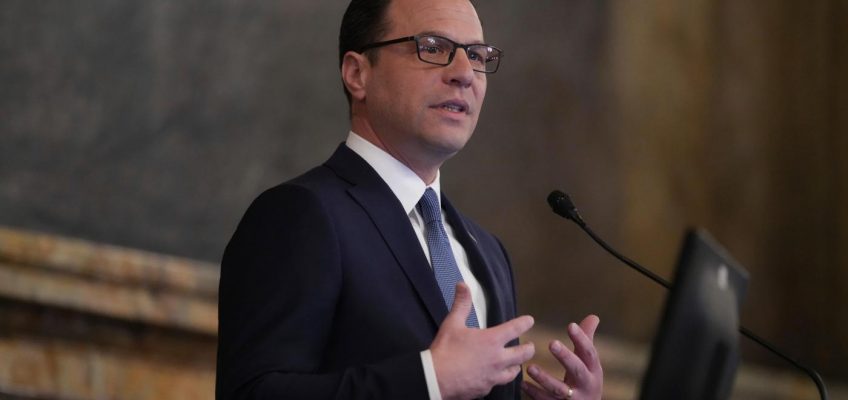Edward Lotterman
“As Trump Tariffs Nuke Markets: Will The Central Bank Step In?”
That headline, on Wednesday, April 9, couldn’t be more misguided. It should terrify everyone because it indicates the degree to which financial market participants, business media and many in the general population have become divorced from reality. The Federal Reserve cannot “step in” and accomplish “rescues” as many assume. It cannot support stock prices. Moreover, it should not try.
Nor should the U.S. Treasury or any other federal agency.
If only people had learned the wisdom the Minneapolis Federal Reserve preached some 30 years ago, our nation would be in a much safer position.
Yes, the rising panic evident early last week in New York, London and Tokyo may well abate into wary unease. Market indexes eventually will find their bottom and people will begin to buy again.
The March consumer inflation numbers out Thursday suggest the threat of inflation, pre-Trump tariffs, may be lessening, and may give us some breathing room. A closer look is more somber. Overall, there are far more rocks and shoals on the economic horizon than fair seas. We still have over-inflated and jittery capital markets, probable high inflation and a significant chance of recession.
All this centers on an erratic, insecure U.S. president who makes the adjective “mercurial” seem woefully inadequate, and arrayed against the backdrop of a dysfunctional and enabling Congress. Our economy is on very thin ice indeed.
So what wisdom did the Minneapolis Fed impart and how does it apply today?
Economists associated with the Minneapolis district were leaders 30 years ago in an intellectual revolution that refuted the Keynesian theories that dominated federal policymaking from the 1940s into the 1990s.
Early economic thinking from the late 1700s until the 1920s taught that free markets were always self-correcting, and that any government interference with the actions and transactions of private individuals and businesses would only cause harm.
Then, as the global economy convulsed after the trauma of World War I, British economist John Maynard Keynes set this belief on its head. He argued that governments not only could, but should, manage economies to avoid both recessions and inflation. Governments and central banks should vary taxes and public spending along with the money supply and interest rates to moderate harmful economic swings and avoid extremes. When inflation threatened, governments should raise taxes and decrease spending and the central bank should reduce the money supply so as to raise interest rates. For a recession, Keynes prescribed the opposite: Cut taxes and increase spending and the money supply to lower interest rates to charge the economy toward growth in hiring and production.
New Zealand economist Bill Phillips supported Keynes’ prescription by tabulating data on inflation and unemployment rates. When graphed, this data showed an apparent trade-off between inflation and unemployment. When one rose, the other seemed to fall.
Spread by influential textbook writers after 1950, Keynesian management of economic cycles became the norm in both econ theory and government policy. In the U.S., it reached its height when University of Minnesota professor Walter Heller headed John F. Kennedy’s Council of Economic Advisors that included two future Nobel winners.
No administration since has gotten close to the average annual 5.6% growth in inflation-adjusted output as in the eight Kennedy-Johnson years. So far in this millennium, average annual real growth barely touches 2%.
Unfortunately, the longer governments and the Fed alternated stepping on the economic gas and brake pedals, in this Keynesian way, the worse the tradeoff between inflation and unemployment apparently got. By the time of the Ford and Carter administrations in the United States, we had high levels of both — “stagflation,” the counter-intuitive simultaneous combination of falling output and employment with price inflation. It hit the United Kingdom, France, Germany and other industrialized economies as well as the U.S.
Younger economists at universities including Minnesota, Chicago and Carnegie Mellon argued Keynesian theory had a fatal contradiction: Reacting to Keynesian micro-management, rational people take self-protective actions as individuals and business managers. These reactions, summed across entire economies, didn’t just stymie the hoped-for effects of activist fiscal and monetary policies. They make things worse.
In the face of apparently intractable economic problems globally, this “Rational Expectations revolution” in economic theory spread quickly. In 1978, the Minneapolis Fed chose the youngest Fed president anywhere, 35-year-old Mark Willes, a believer in the new approach.
A Columbia Ph.D., Willes quickly centered Minneapolis in this movement. It offered key thinkers joint positions at the Fed to complement university roles. For 25 years, the Universities of Chicago and Minnesota together with the Minneapolis Fed were where rational economics was done.
Theory aside, the core policy prescription saw that attempts at economic micromanagement were self-destructive. Central banks could, and should, maintain stable purchasing power of a currency. They could not, however, cure all ills of any economy and should not try.
Gary Stern, Willes’ successor at the Minneapolis Fed, supported his researchers, but had more pragmatic concerns. He recognized that the emerging doctrine that some banks were “too big to fail” posed great dangers. This came to the fore in 1984 when the FDIC “rescued” an insolvent Continental Illinois Bank, then the seventh largest in the country. It absorbed some of its losses and sold good accounts to Bank of America.
The “too big to fail” rationale here was that full liquidation, forcing depositors above the level guaranteed by the FDIC to eat large losses, would so shake confidence in the financial system that a generalized financial crisis might spark, nationwide if not worldwide.
Stern vigorously argued that once investors learn big institutions would be bailed out, that is where they would place their money. This is called “moral hazard,” the creation of incentives for societally harmful actions. If the rule is “heads I win and tails the FDIC, Treasury and Federal Reserve lose,” risk taking runs wild.
In speeches, bank publications, op-eds and interviews, Stern and colleagues voiced this warning with Paul Revere-like energy. In 2004, with Ron Feldman, now the No. 2 Minneapolis Fed officer, Stern wrote “Too Big to Fail: The Hazards of Bank Bailouts,” an influential book with a ringing forward by former Fed Chair Paul Volcker.
So, at the dawn of this millennium, the Minneapolis Fed vigorously preached a two-part sermon: Activist monetary policy to manage all ups and downs in the business cycle led to harm, perhaps great harm. So did promising financial firms, the markets in which they operated, and the general public that the Fed and U.S. Treasury would rescue them all from any possible financial train wreck.
Of course, if we refuse to rescue large financial firms from bad decisions, we either must keep any from becoming too large or regulate large ones very closely. That never happened. After 9/11, the Fed swooped in with an increased money supply and low interest rates. The created a new moral hazard, and then the Fed and other regulators stood by while new derivative financial instruments — collateralized mortgages and other debts — created a price bubble. When it popped by 2008, the Fed and President George W. Bush’s treasury secretary organized the largest bailout in human history, one that prevented economic collapse but punished the innocent and rewarded the guilty.
In 2020, facing the worst pandemic in a century, the Fed increased the U.S. money supply by a third in 20 months, a jump unprecedented in U.S. history. Done in good faith, it helped keep the U.S. economy afloat. But that monetary surge also contributed to severe inflation and a bubble in capital markets that, together with untested innovations like cryptocurrencies, now threaten the world economy.
All of which bring us back to Wednesday’s misguided headline, and the expectation — contrary to the correct principles of the Minneapolis Fed — that our government and central bank can and should regulate our financial bad behavior in all its aspects and make it all better.
Now the danger is extreme. The bad behavior now is that of an erratic and volatile president, sycophantic and inexperienced Cabinet secretaries, an absentee Congress and financial market players beset with delusional expectations of bailouts. Hold on tight!
Real World Economics: The flaws in Trump’s ‘liberation’ reasoning on tariffs
Real World Economics: Unkept promises are bad economics
Ed Lotterman: Attacking Denmark about Greenland is wrong, dumb and damaging
Real World Economics: Tariffs raise questions, here are some answers
Real World Economics: Stagflation bullets are already in the air
St. Paul economist and writer Edward Lotterman can be reached at stpaul@edlotterman.com.




